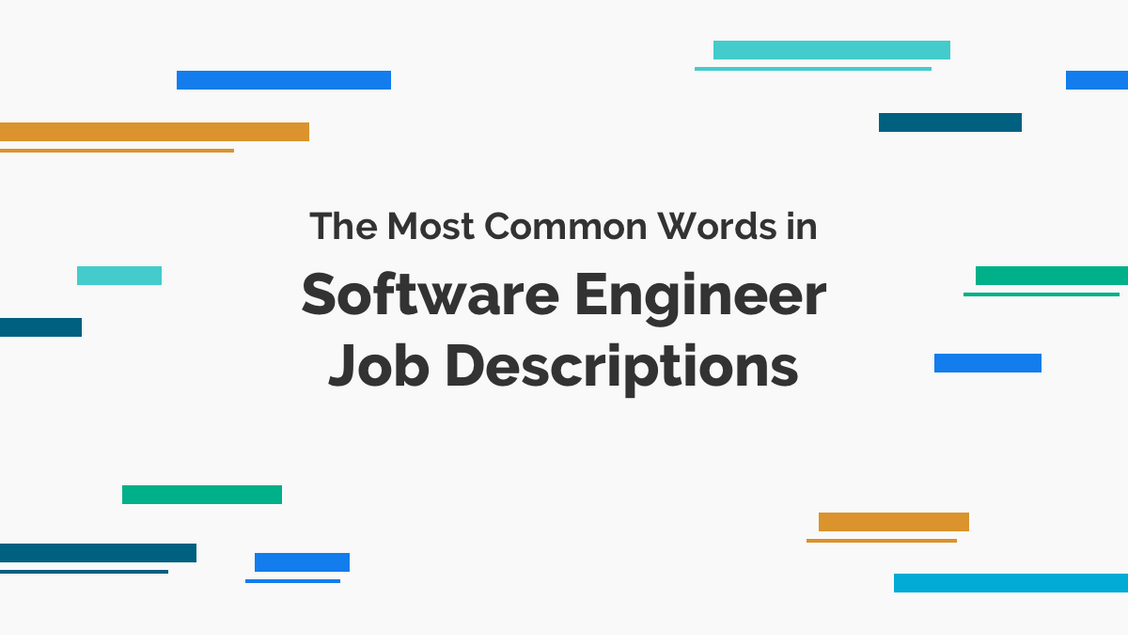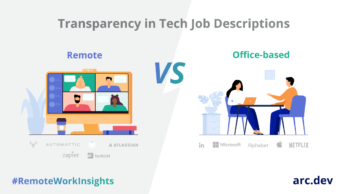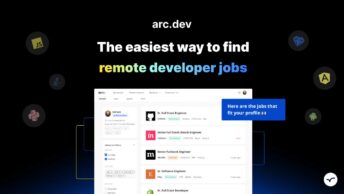You need to hire a software engineer and have 49 seconds to make a killer impression with your job description — and you’re competing with Google, Facebook, and the like in order to get the best possible candidate for your company.
To help you write the job description that attracts the right candidates, we did an in-depth analysis of developer job descriptions — from companies ranging from 1-10,000+ employees — on Stack Overflow’s job pages to see what words are the most common. By looking at these words, we can see what qualities and skills are most in demand and what the market looks.
We looked at Back-End Developer, Front-End Developer, Full-Stack Developer, Senior Developer, and Engineering Manager job descriptions and included tips for improving your own description for each of those job positions.
By knowing what you’re up against, you can write a better job description to attract software engineer you’re looking for.
Looking for top talent fast? See how Arc can help you:
⚡️ Find developers, designers, marketers, and more
⚡️ Freelance or full-time remote + fully vetted
⚡️ Save up to 80% with global hires
Hire top talent with Arc risk-free →
Methodology
The methodology of this post was relatively simple. We looked at the job descriptions posted on Stack Overflow Jobs, using the categories back-end, front-end, full-stack, senior developer, and engineering manager to find job descriptions to examine in greater detail.
Although we looked at job descriptions from a variety of company sizes, from a lone wolf employee to a 10,000+ strong company, we showed a preference for companies sized 51-200 as a happy medium for company size. We also gravitated towards companies with more detailed job descriptions.
To make the lists, we copied the text of the job descriptions from Stack Overflow and extracted only the words relevant to job responsibilities and requisites, and ended up analyzing over 7,800 words from 40+ job descriptions. When ranking the words to populate our lists for each category, we only used words that appeared more than once.
Read More: How to Hire Software Developers: 18+ Expert Tips & Essential Strategies
Overall Software Engineer Job Description Trends
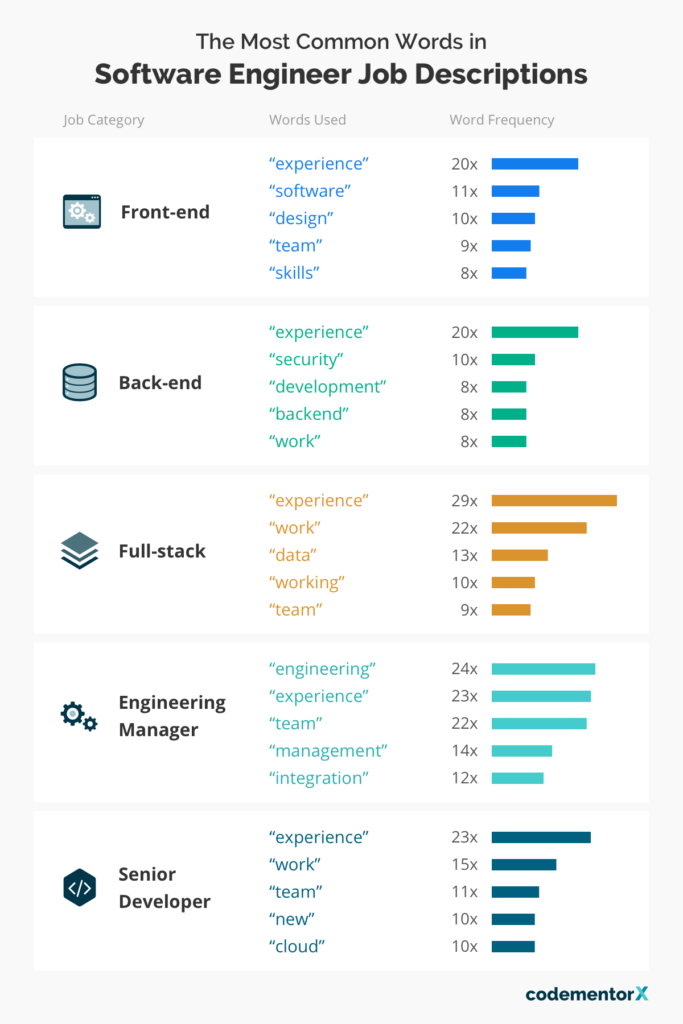
Experience is Important
There’s no escaping it. By and large, experience was the word that appeared most frequently in (almost) every category. While it’s fair for the word “experience” to appear in job descriptions — in fact, it would be downright strange if it didn’t — the frequency at which it appeared across the board may be surprising.
Job descriptions requesting “3+ years of experience” or “experience in working with teams,” along with a list of technologies isn’t out of the norm, but, contrary to expectations where the word only appear once or twice, the word “experience” shows up much more often than that. Other examples include “work experience” and “experience working with X” followed by individual points of emphasis.
More so than team, work, or specific technologies, companies looking for software engineers repeatedly wanted experience, be it for front-end, back-end, full-stack, or senior developers. If we were to remove experience from the list, other words that crop up often across the board are “team” and “work.”
Read More: How to Implement a Welcoming Software Developer Onboarding Process
There’s no “I” in Team
Team is the next word that appears frequently across software engineer job categories. It appears in the top five of every job category except for back-end developers, in which it ranks sixth in terms of frequency. It appears fourth for front-end developers, fifth for full-stack developers, and third for engineering managers and senior developers.
This means that there is considerable emphasis on teamwork in today’s job market. This is especially true for engineering managers, where “team” shows up as much as three times as often as it does for back-end developers, where it appears the least often. Candidates are expected to “talk to your team,” be a “motivated team member,” work “together with your team” to write code, and invited to join an “established, high performance team.”
Whether it’s because companies want to seem approachable and inclusive, or because the nature of software engineering requires extensive teamwork, contrary to stereotypes of the lone wolf developer, the ability to work and jive well with a team is an important quality prospective candidates (and hiring personnel) should keep in mind.
Work It
Finally, the last word that appears across the board is “work.” “Work” appears in three out of five job categories — the exceptions are front-end developers and engineering managers. It ranks fifth for back-end developers and second for full-stack and senior developers.
If you’re wondering about the context in which “work” appears, it’s not always linked with the word experience. While companies do talk about “work experience,” they also emphasize what the candidate will “work on,” the team that they will “work with,” as well as the “work at scale” that they will be potentially doing.
Finally, companies mention that they want candidates who “love their work.” In placing value on the meaningful work the candidate will do, as well as the environment they can provide for developers to “love their work,” companies are hoping to attract the best talent in today’s competitive hiring landscape.
Read More: Andela vs Toptal vs Turing vs Arc: Which is the Best Andela Alternative?
Ready to write your own tech job descriptions?
Check out our entire set of tech job descriptions and choose the one which fits your hiring needs best:
- Software Engineer Job Description
- Python Developer Job Description
- Front-End Developer Job Description
- Angular Developer Job Description
- Back-End Developer Job Description
- Cloud Architect Job Description
- JavaScript Developer Job Description
- AWS Cloud Engineer Job Description
- AWS Cloud Practitioner Job Description
- AWS Cloud Architect Job Description
- Scrum Master Job Description
- Full Stack Developer Job Description
- Node.js Developer Job Description
- Cloud Engineer Job Description
- DevOps Engineer Job Description
- Web Developer Job Description
- React Developer Job Description
- Ruby on Rails Developer Job Description
- Agile Product Owner Job Description
- Agile Project Manager Job Description
- Remote Developer Job Description
Or, say goodbye to writing job descriptions altogether with HireAI. Discover top remote developers instantly without manual searching and screening. Try HireAI now!
Back-End Developer Job Descriptions
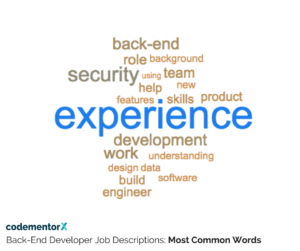
One back-end developer trend we noticed is that employers typically describe the specific frameworks/languages they’re looking for in back-end developer candidates more so than for other categories of software engineer. Frameworks and languages that your competition is looking for includes: Spark, Kafka, Java, PostgreSQL, Docker, Ansible, Kotlin, and AWS.
Another point worth noting is the emphasis on the word “security” for back-end developers. The word “security” ranks as the second most frequent for back-end developers. Interestingly enough, the word “security” only appears in back-end developer job descriptions — it doesn’t even come up for full-stack, engineering managers, or senior developers. This may be because back-end developers are responsible for the hardware and architecture of a company’s projects, thus security is a major issue they would have to deal with.
Finally, “development,” “back-end,” and “work” appear with the same amount of frequency across the board for back-end developers. Unlike other job categories, where word frequency can vary dramatically, e.g., engineering managers, the top words for back-end developers is fairly consistent, which suggests homogeneity among companies looking for back-end developers.
Front-End Developer Job Descriptions
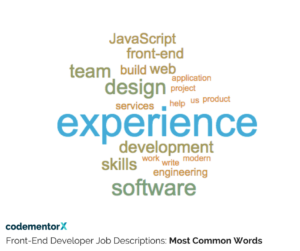
Given that JavaScript, HTML, and CSS are the bread and butter of front-end development, you’d probably expect that they’d be in the top five for front-end developer job descriptions. Instead, the top ranked skill word was JavaScript, which came in seventh place. The next most common word, HTML, came in 33rd, CSS 34th, and Typescript 42nd place in terms of word frequency. In contrast, React, Angular, and other frameworks/libraries weren’t used more than once in many of the job descriptions posted.
Next, the word “software” shows up more frequently for front-end developers than for any other job category. In fact, it shows up more than twice as often for front-end developers as it does for senior developers and back-end developers. “Software,” often in conjunction with development, is heavily emphasized in front-end job descriptions, along with “design.”
The word “skills” appears most frequently in the front-end developer job category, compared to their other software engineer counterparts. “Skills” appears next frequently in the back-end category, followed by full-stack, and trailed by engineering manager. The word “skills” does not appear in the senior developer category at all.
Read More: How Much to Hire a Software Developer: Freelance vs Full-Time Costs
Full-Stack Developer Job Descriptions
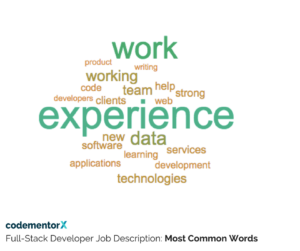
For full-stack developers, the word “experience” shows up the most often (a whopping 29 times total) in full-stack developer job descriptions. The next most frequent use of “experience” is 23 times, in the engineering manager and senior developer job categories, and 20 times for front-end and back-end developers.
Is it all work and no play for full-stack developers? “Work” and “working” take up two spots on the top five list for full-stack developers, which means that employers plan on keeping them occupied. All in all, some form of the word “work” shows up 32 times in full-stack developer job descriptions, making it the most frequently used word across the board if we were to double count.
Finally, “technology” is the sixth most common word for full-stack developers, playing runner up to variations of the word “work.” Fun fact: “technology” would be ranked be fifth if “work” and “working” were only counted as one word. That being said, technology’s ranking on the full-stack list is the highest ranked use of the word across the board, with the next highest ranking of the word at 19th for back-end developers.
Senior Developer Job Descriptions
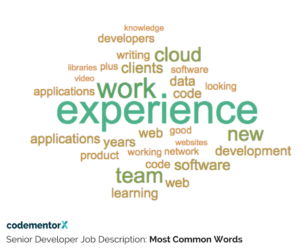
It’s all in a day’s work for senior developers. The word “work” ranks in the top five for senior developers, back-end developers, and full-stack developers. Interestingly enough, the word “work” shows up twice as often for senior developers as it does for back-end developers, and about two-thirds as often for senior developers as it does for full-stack developers.
The words “team,” “work,” and “new” are ranked very close together in the top five for senior developer positions. We’ve talked about “team” and “work” before, but the word “new” is, well, new. The frequency count for these words is very close together, which suggests companies across the board consistently favor these traits for senior developers compared to a wider range of words in other job categories.
The word “new” is in the top five rankings for senior developers, with a frequency of 10. It’s used to describe “new team members” “new technologies” and “new frameworks.” The only other job category that features the word “new” is full-stack developers, where it ranks seventh, with a frequency of eight. This might imply that companies are looking for senior developers and full-stack developers that can push the envelope when it comes to technological skills.
Read More: 40+ Best Upwork Alternatives & Freelance Websites for Your Next Project
Engineering Manager Job Descriptions
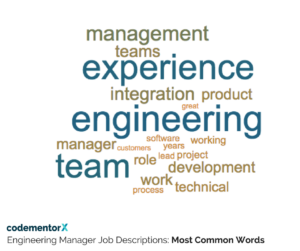
Another fun fact: engineering managers is the only category where “engineering” was the most commonly used word. For all other categories, experience was the most popular word. That being said, it was a tight race, with “engineering” narrowing edging out “experience” by one. While the job title does favor the word “engineering,” it’s also used to describe “engineering management,” “engineering team,” and “engineering role.”
Although it’s the fifth ranked word for this role, the word “integration” is used 12 times. Compared to the fifth ranked word for other categories, “skills,” “work,” “team,” and “cloud,” which appear between eight to ten times across the board, “integration” is used more frequently, which suggests that there is a lot more emphasis on integration for engineering managers.
Finally, “product” is the sixth most commonly used word for engineering managers. The sixth place ranking for “product” puts it high on the list across all of the job categories, underscoring its importance for engineering managers. In fact, “product” ranks 10th, 22nd, 19th, and 44th for back-end, front-end, full-stack, and senior developers, respectively.
How to Write A Compelling Job Description
So now that you know what other people are writing, how are you going to gussy up your job description draft? Besides the important stuff written in the software engineer job descriptions that attract the best developers post we linked above, and in our language based hiring guides, here are three tips for you when writing your compelling software engineer job description.
First, as we know from the data, make sure you have your experience requirements written right off the bat. If you need expertise in specific technologies and need a particular amount of experience in those particular languages and/or frameworks, don’t be shy about throwing around the word “experience.” If these experiences are bonuses and nice to haves rather than a hard must, put that down as well — if someone is a perfect candidate other than one fewer year of experience in X technology, you don’t want them to walk away instead of applying if it’s not a hard must for you.
Second is the cultural fit. If your company culture is very team oriented and you want someone who meshes well with others, be sure to emphasize “team” and “working closely with engineering team” in your job description. If an individual who gravitates towards teams is not a priority for you, you can feel free not to emphasize this as much. By putting your company culture priorities out there, you’re making it less of an unpleasant surprise come interviewing and/or onboarding time.
Finally, above all, given the frequency of the word “work,” in both the day-to-day responsibilities and passion for the job, make sure the candidate knows what they’re going to be doing for you. Make sure they know what they’ll be “working on,” “working with,” and “working for,” in your job description. In other words, your candidate should know exactly what they’re signing up for in terms of duties, company culture, and mission.
Writing is an underrated skill, yet writing a compelling job description can help you keep up with the Googles of the world when it comes to hiring a great software engineer — or at least stay a step ahead of your competition. When it comes to writing a software engineer job description, don’t be afraid to be specific, be honest, and put your best foot forward. Remember, while you’re shopping for a great employee, he or she is shopping for a great job too.
Read More: Hiring In-House vs Remote Developers: Cost & Competitive Advantages
You can also try Arc, your shortcut to the world’s best remote talent:
⚡️ Access 450,000 top developers, designers, and marketers
⚡️ Vetted and ready to interview
⚡️ Freelance or full-time


